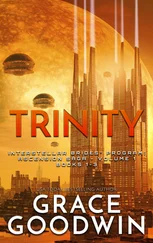Hzzzzzzz.
Beneath Omaha, Icarus looked up at the sixteen-foot-missile-display screen. He saw the one with his name on it arching down out of suborbit, edging over the Canadian wastes. It was not missing. High above, flying farther away from Omaha at 42,000 feet, the Looking Glass general looked at the same data being relayed to him. Bull’s-eye.
“Cretins,” Icarus said.
“Cretins,” Alice said.
The phone conversation paused briefly.
“Moreau’s kid is on alert duty tonight,” Icarus said without emotion. “The girl. At Fairchild.”
Alice thought a second. “He’d probably prefer it that way.”
“Yeah,” Icarus said. “You getting all the data? The SIOP data? Missile-impact projections? The submarine missiles have begun to impact.”
“Yes, general.”
“My clock says nineteen minutes.”
Alice looked at his watch. “0611 Zulu,” he said, preferring to mark time that way. Icarus was looking at his execution date. Alice felt uncomfortable—as if he were running away, being up here.
“Even all these misses are gonna knock the shit out of your computers and radio gear.”
“I know, sir.”
“Might be hours before you get the stuff back up.”
“We’re good, sir.”
Hzzzzzzz.
“Yeah, I know you are. It’s gonna get busy around here. I’ll try to get back up to you with a couple of minutes to go. Harpoon, too. Give you both a last good read. If I’m not arguing with some piss-ant politician.”
“Just be your usual diplomatic self, sir.”
“You can count on that.”
• 0630 Zulu
To Halupalai, the wave was mystical, almost metaphysical. His earliest memories, those spellbinding image warps of infancy, etched the wave in some magical place in his mind. Even before he could speak, he toddled down to the sandy beach to watch it for hours, entranced. It emerged from the sea, swelling hypnotically until the little boy’s neck craned high to watch the sunlight filter through the perfect prism of its curl. Then it crashed, thundering with the infinite power of nature, and sent swirls of foam and churning coral bits and little messages from distances undreamed washing up around the boy’s naked feet. He could imagine no power greater. Soon his father taught him how to meld with it, not conquer it, for that was futile and wrong and ungodly. He learned to slice through its awesome strength, his body a spear, a swim far out beyond into the peaceful cradle of the sea. There he would bob for an entire afternoon before returning, stretching his young body rigid to ride the curl. Still later, he learned how to ride inside the curl, caught within the prism of dancing, holy light. He took endless voyages inside the curl, respectful of its power, worshipful of the halo of green-white radiance surrounding him. One day his father took him to the island of Oahu and they traveled north to the remote beach called Makaha. The boy stood mesmerized. The wave rose out of the ocean like a mountain, taller than the palms, taller than the houses. It loomed four, five times as high as anything he had seen on Kauai. The water roiled like a devil’s caldron at his feet. He looked up at his father, his eyes asking in both fear and expectation: Is this the next test? His father shook his head no. This was for fools and haoles, mainlanders who believed they could control all forces. A dozen years later, however, Halupalai came back, a high-school boy full of beer and the playful challenges of a California-born schoolmate, a haole who had conquered every wave from Malibu to San Onofre. Halupalai caught the curl of a thirty-footer, riding it flawlessly and ecstatically, never feeling such exhilaration as he pulled himself from the whirlpool tug of the caldron moments later and threw himself on the beach. His friend never came out. They found him later, his spine snapped clean where the curl had landed on it.
As the light invaded the B-52, Halupalai sat with his back to the cockpit. O’Toole sat alongside him. Halupalai closed his eyes instinctively, but even so, even with his back turned, the light was so strong he could see the veins in his eyelids twist like rivers on a roadmap. Just as instinctively, he reached for the ejection lever, as he had in Vietnam. But he pulled his hand back abruptly. He braced himself. He did not want his hand on the lever when this wave hit.
Up front, Kazakhs began counting even before he looked at Moreau. He continued to count as his own flash-shocked vision fought to focus on her one vacant eye. He ticked off the seconds as he implored her to help him push their aircraft higher, higher.
Three…
Four…
The Buff was tough. But he knew it broke, sometimes under natural forces they still didn’t understand. More than once Kazakhs had felt the godawful shudder, heard the thunderous crack of the B-52 in whiplash, as he roared low over mountain ridges where powerful wind currents collided and clashed.
Five…
Six…
The Air Force kept the occasional crashes as quiet as possible. But Kazakhs heard. And Halupalai heard. And they both knew another Buff’s back had been broken, snapped clean by the same kind of roiling forces that cracked a man’s back in the ocean surf.
Seven…
Eight…
Kazakhs did not know what would happen now, for this would be no natural force and no man had ever felt it, no aircraft had ever been subjected to it. He knew only that survival was ninety percent luck of the draw, ten percent him. He would play the ten percent and climb, climb.
Nine…
Ten…
Moreau pulled with him, thank God for that. It would take both of them. He squinted, trying to readjust his eyes to the red light. The altimeter read 8,500 feet, 8,600.
Eleven…
The blast wave arrived with no noise interrupting the engine drone. But Kazakhs felt as if he had been hit in the gut first, then clubbed by a street fighter. The impact hurled him forward into the pinched embrace of his seat harness, then whipped him back. He could feel what he couldn’t hear—the B-52’s wings groaning under the immense stress. Groggily he fought to keep the plane climbing.
“Get the nose down, Kazakhs!” Moreau’s steely voice hammered through the pilot’s haze. “Dammit, you’re going to stall us!”
Fuzzily Kazakhs concentrated on the air-speed gauge. It read under Mach point-five, about 325 miles an hour, two-thirds of the climb speed just seconds earlier. The horizon indicator seemed to have been blown completely out of kilter, showing them at a thirty-five-degree angle of attack, nose up, tail down. The altimeter was at ten thousand feet and still rising. It made no sense at all. His training told him the blast wave would drive the plane down, not up.
“Gauges malfunctioning!” Kazakhs shouted.
“No. Nose down!”
He ignored the copilot’s dissent. The air-speed indicator dropped to Mach point-four, yellow alarm lights flashing like bonus lamps in one of his pinball palaces. He ignored them, too—little liars nuked—and held on as if he were strangling the wheel. Mach three-point-five. Kazakhs, following his instincts, was doing everything wrong. Pain stabbed at his forearm. He turned to strike back at Moreau, who had judo-chopped his right arm to loosen the grip that threatened to put them in a fatal stall. She sat hunched over her wheel, nudging the nose down. Mach three-point-seven. Then the aftershock hit, the wave sending a quiet shudder upward through the pilot’s feet, and then again, twice more, rapidly, pocketa, pocketa, massaging his back like magic fingers in a cheap motel. All three aftershocks were soft, feathery, gentle—and telling. Kazakhs withdrew his upheld arm, took the wheel, and helped Moreau get the nose down.
Читать дальше












